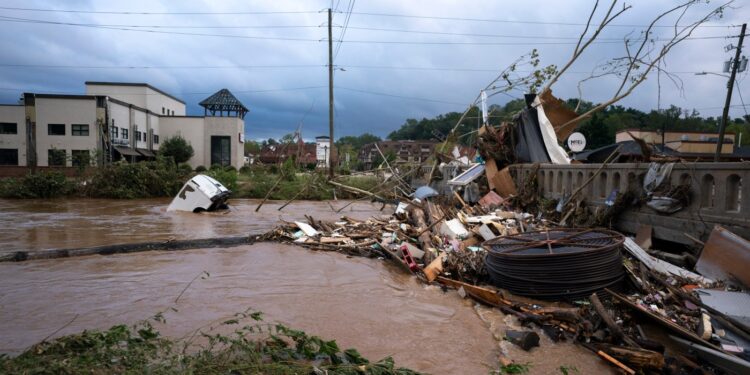
Deerfield-based Baxter International has temporarily closed its largest manufacturing plant following damage caused by Hurricane Helene — a move that raises questions about supplies of the medical products it makes there.
The North Cove plant, in Marion, N.C., is not only the company’s biggest manufacturing facility, with more than 2,500 workers. It is also the largest manufacturer of intravenous and peritoneal dialysis solutions in the U.S. Intravenous solutions are used in hospitals and other care settings to deliver medication, keep patients hydrated and/or address electrolyte imbalances.
It was not immediately clear Monday whether the plant’s closure will lead to significant shortages of the solutions for patients. Baxter said in a news release Monday that it is taking steps to minimize supply disruptions, such as by leaning on its global manufacturing network.
“Remediation efforts are already underway, and we will spare no resource — human or financial — to resume production and help ensure patients and providers have the products they need,” said José Almeida, Baxter chair, president and CEO, in the news release.
Ahead of the storm, Baxter implemented its hurricane preparedness plan, which included moving products to higher ground or securing storage, the company said. But a levee was breached, leading to flooding at the plant. Bridges used to access the plant were also damaged.
Baxter said it will provide an update, as soon as it is able to, about when it plans to resume production.
Wells Fargo analysts wrote in a research note Monday that it was still too early to tell whether the shutdown would affect medical procedures in the U.S., and it would likely depend on how long the plant was closed. They noted, however, that they believe that three other companies that manufacture IV solutions will be able to offset some of the lost supply.
Erin Fox, associate chief pharmacy officer at University of Utah Health and an expert on drug shortages, said a shortage is likely, given that events such as shipping delays and ice storms can cause shortages.
“At this point, we don’t know how significant the shortage will be but I do expect there will be supply problems,” Fox said.
It can be difficult for hospitals to keep huge supplies of extra intravenous solutions on-hand in case of shortages, she said. Hospitals may only keep a week or two worth of intravenous solutions at the ready, she said.
“You need it in very, very large quantities, so it’s very difficult to buffer against shortages,” Fox said.
During past shortages of the solutions, the U.S. Food and Drug Administration worked to bring in imported products and asked other companies to ramp up production of them, she said.
This is not the first time a hurricane has affected Baxter’s production. In 2017, Baxter products were in short supply after Hurricane Maria devastated Puerto Rico, where the company had three manufacturing sites. Following that hurricane, the FDA began allowing Baxter to import its so-called mini bags — used by hospitals to give patients intravenous fluids and medicine — from its facilities in Ireland and Australia. The FDA also allowed imports from the company’s facilities in Canada and Mexico at the time.
This latest disruption is expected to negatively affect the company’s financial results, Baxter said.
Originally Published:







